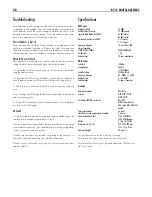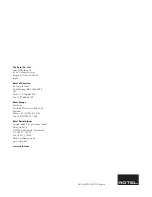
19
English
Glossary
Bit rate
– Speed of data transfer – how many bits of information are
sent each second.
Buffering
– data downloading and being assembled before
playback.
Codec
– [Coder/Decoder] software capable of encoding and/or decoding
a digital data stream or signal.
Data Encryption
– the encryption of data for security purposes. For
wireless networks this is normally WEP and WPA.
DHCP
[Dynamic Host Control Protocol] – A protocol for assigning IP
addresses to devices on a network.
DNS Server
– A remote server that provides the translation of web
addresses into the corresponding numeric IP addresses.
ESSID
– [Extended Service Set Identifier] The ESSID is a unique identifier
for your wireless network.
Ethernet
– Network technology for local area networks. Cat5 cable
carries information between computers at a rate of 10/100/1000
megabits per second.
File format
– The type of file e.g. a music file in the format of .mp3.
File Server
– A computer or device that provides workstations on a
network with controlled access to shared files.
Firmware
– embedded software in a device that provides the devices
with operational instructions.
Gateway
–The access point from LAN to WAN.
Internet
– a computer network consisting of a worldwide network of
computer networks.
IP Address
– is a numerical label that is assigned to devices in a
computer network.
ISP
– Internet service provide.
Kbps
– Short for kilobits per second, a measure of data transfer
speed.
LAN
– [Local Area Network] a local computer network for communication
between computers.
MAC
– [Media Access Control] is a unique identifier assigned to
network adapters or network interface cards by the manufacturer for
identifcation.
Modem
– [Modulator/Demodulator] device used to connect computers
by a telephone line.
Network
– A system of interconnected electronic components or
computers.
Network adapter
– A hardware device, installed inside computers
that connect computer devices together to create a network.
Podcast
– An audio file delivered via an RSS feed over the Internet to
a subscriber.
Router
– A device that joins multiple networks or computers together.
RSS feed
– [Really Simply Syndication feed] used to publish content on
the web which people can then subscribe to and receive updates.
Server
– A computer that provides client computers with access to files
and printers as shared resources on a computer network.
Subnet mask
– A method of splitting IP networks into subgroups.
UPnP
– [Universal Plug and Play] a method of auto configuration used
in devices such as PCs, peripherals, wireless devices and intelligent
appliances.
URL
– [Uniform Resource Locator] the format of the address for a particular
page of a website.
USB
– [Universal Serial Bus] Connection commonly used with computer
peripherals.
WAN
– [Wide Area Network] computer network that spans a wider
area than a local area network e.g. the Internet.
WEP
– [Wired Equivalent Privacy] a wireless security protocol to prevent
access to the network by “intruders” using similar wireless LAN equipment
and capture of wireless LAN traffic through eavesdropping.
WPA
– [WiFi Protected Access] a wireless security protocol that replaced
the weaker WEP.
WiFi
– [Wireless Fidelity] – a radio frequency standard that is used to
connect devices, such as computers and iPods, together using a wireless
connection.


































